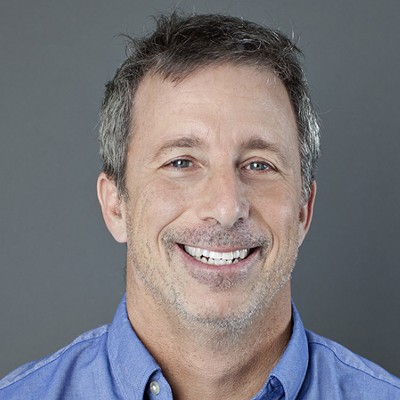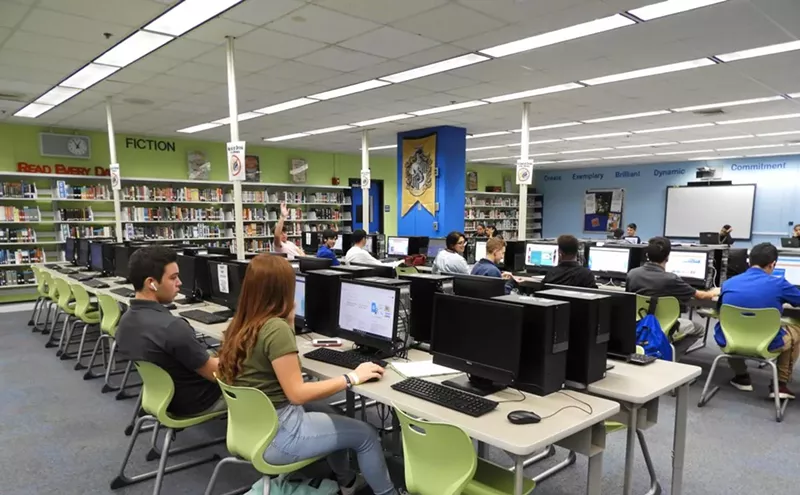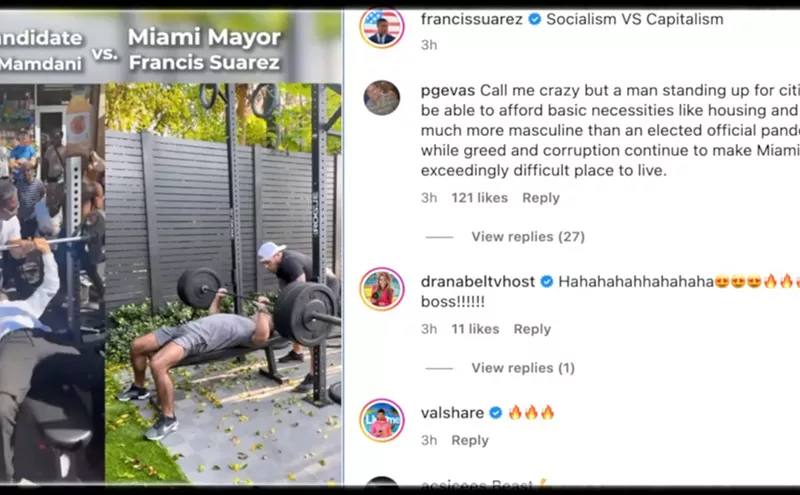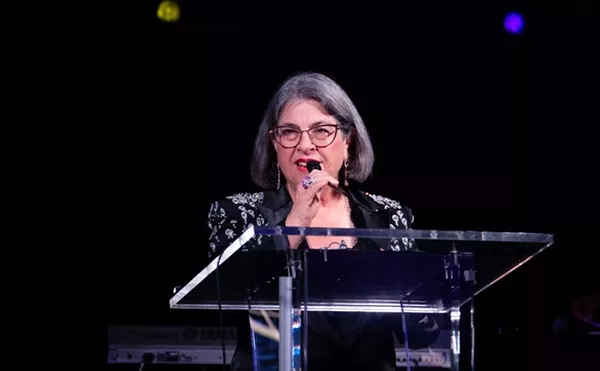Inside a festooned clubhouse in Westchester, a handsome 82-year-old in a dark suit smiles and points an index finger skyward. Though light is dim, his blue eyes, bushy gray brows, and estimable paunch are evident. Speaking quietly to a few sycophants, he appears a typical senescent guajiro, with one exception: His arms, chest, and jaw are covered with scars, the result of assassins' bullets.
He's Luis Posada Carriles, Cuban exile hero, ex-CIA agent, and legendary terrorist.
The alleged murderer of at least 74 innocents will go on trial soon in Texas, though a judge last week delayed the case. Watch for it. If he's found innocent, it will signal the government's ineptitude, hypocrisy, and corruption. And even if there's a conviction, the penalty will likely be minimal, and the effect on the upcoming trial of the 9/11 killers could be significant.
"The bottom line is that the Justice Department is trying to hold him accountable for horrible acts of terrorism," says Peter Kornbluh, a spokesman for Washington D.C.'s National Security Archive. "But this case, as they say in Spanish, is a vergüenza — a disgrace."
There's ample evidence Posada tried to assassinate a world leader, hatched a plot that killed scores, and dismembered a tourist in a hotel bombing. Yet he is not being tried for any of those offenses, because the government botched the case and shredded critical evidence. In the end, Posada is being accused of lying to authorities, a slap on the hand that would outrage the nation if he were, for instance, an Arab. But he's Cuban, and that makes all the difference.
(Posada couldn't be reached for comment, and his attorney, Arturo Hernandez, would say only, "We are uniformly turning down media requests.")
Posada was born in Cienfuegos, studied chemistry, and worked in Akron, Ohio, before the 1959 Cuban revolution. He returned to the island but, like many Miami exiles, quickly became disenchanted with Fidel Castro's vision. So he moved to the United States. His sister, a colonel in the Cuban army, stayed put.
Then, with the help of millions of American tax dollars, Posada began a bloody, half-century-long campaign against the Castro government. He set off pencil bombs in the island's capital and coordinated the 1961 Bay of Pigs attack from Central America. After the invasion failed, he was among exiles who attended an elite Army academy in Georgia; he graduated two years later as a spy and lieutenant.
He then tried to kill Castro using a gun disguised as a camera and plastic explosives stuffed into a Prell shampoo bottle. In 1976, he masterminded the downing of Cubana Flight 455 with 73 people onboard. Six years later, pressured by the United States, a Venezuelan court cleared him; then it bizarrely changed course and decided on a retrial. But the wily spy bribed guards, escaped, and two decades later bombed Havana hotels, causing millions of dollars in damage and killing an Italian tourist.
"It's a war," he told author Ann Louise Bardach during a 2006 interview described in her book Without Fidel: A Death Foretold in Miami, Washington, and Havana, "a bad war."
Of course, Posada has strong supporters both in and out of government. In a few days, backers gathered thousands of dollars for his defense during what they termed a "radio marathon" on Radio Mambí (710 AM). "Luis Posada is a great man," proclaimed one of about a dozen elderly exiles who spoke on his behalf. "His war will make Cuba free."
Incredibly, this sentiment has swayed prosecutors and Congress. Even the FBI, which spent millions of dollars over several decades probing Posada's spy work, inexplicably shredded most of its evidence. What's more, the Reagan administration hired Posada as part of the Iran-Contra scandal.
U.S. pressure has even had an effect abroad. A Panamanian court convicted Posada of plotting to kill Castro during an Ibero-American Summit. Then, in 2004, President Mireya Moscoso pardoned Posada. He left just before the Central American nation's supreme court annulled her decision.
The soon-to-be tried case against Posada began after he sailed illegally into the United States and applied for political asylum. In March 2005, likely after getting wind of trouble from friends in high places, he announced to reporters he would leave. But after the show was over, agents arrested him. His crime wasn't killing the 73 people aboard the Cubana airliner or the tourist in Havana; it was lying to immigration agents about his trip to the States and illegally crossing the border.
He had arrived on a boat named the Santrina, not on a bus as he had told the government during interviews. He also deceived them about his passport, prosecutors allege.
In 2006 and 2007, both a congressional subcommittee and a grand jury in Newark considered Posada's murder spree. Bardach's reportage was a key to the case against him. He virtually admitted his guilt, saying the murder of the Italian tourist "was a freak accident, but I sleep like a baby." The government subpoenaed the author's notes and tapes. Supported by the New York Times, which had published her story (co-written by Larry Rohter), Bardach refused, and a long legal battle ensued. (She declined to comment for this story.)
Then the case against Posada almost fell apart. Under the sway of President George W. Bush and a Republican, maniacally anti-Communist Congress, the subcommittee and U.S. Attorney General Michael Mukasey did nothing. And on May 8, 2007, U.S. District Judge Kathleen Cardone freed Posada, criticizing prosecutors for "fraud, deceit, and trickery."
"The government's tactics in this case are so disgraceful and scandalous that they violate the universal sense of justice," she wrote.
The next year, an appeals court threw out Cardone's decision and ordered a new trial. This time, though, Posada wouldn't be charged with illegally entering the country — only with lying to federal agents. A wrinkle was added when Bardach's notes were obtained, and he was charged with lying about the Havana bombing.
Worse, in the leadup to the trial, the court has buckled to prosecutors and sealed almost all the investigative documents related to Posada. Last July 10, the Miami Herald and the Associated Press tried to intervene in the case. Their idea: The government cannot haphazardly seal documents unless they are classified "secret." But the court has essentially rebuffed the attempt, sealing more than 300 documents just this year.
"Badly done," says Adolfo Jimenez, lawyer for the Herald and the AP. "The whole case is essentially being kept from the public."
Cardone recently announced the trial would probably last two months. A wacky group of leftists, the National Committee to Free the Cuban Five, has announced it will protest during the trial. And last October, Kornbluh's National Security Archive published declassified government documents showing Posada even betrayed the exile community. Under the code name Pete, he informed the CIA about the activities of leaders including the now-departed Jorge Mas Canosa.
So here we are. The government destroyed much of the evidence. A respected federal judge declared prosecutors guilty of fraud. And while letting a rather important case melt away, the government is battling not with its enemies, but with the press (Bardach, the Herald, and the AP).
Prosecutors might even lose the pathetically limited remaining case they have against one of the most dangerous ideologues in the Western Hemisphere. But Kornbluh remains hopeful. "This trial can confirm what everybody already knows," he says. "Luis Posada is a leading purveyor of terrorism."
Writing fellow Erik Maza contributed to this report.












